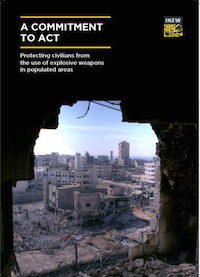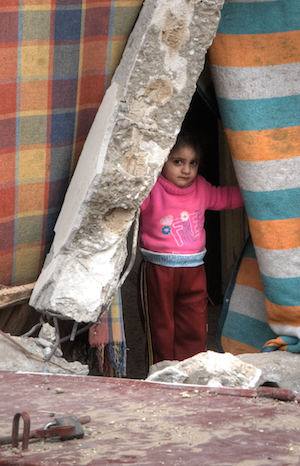 The bombing and bombardment of towns and cities is recognised as a major cause of civilian suffering in conflict. This new booklet ‘A commitment to act: Protecting civilians from the use of explosive weapons in populated areas‘ is a resource to support work to prevent that suffering. It provides background on the humanitarian problems caused by the use of explosive weapons in populated areas and on the actions that can be taken by governments to address these problems. In particular it calls on states to develop a common commitment to stop the use in populated areas of explosive weapons that have wide area effects.
The bombing and bombardment of towns and cities is recognised as a major cause of civilian suffering in conflict. This new booklet ‘A commitment to act: Protecting civilians from the use of explosive weapons in populated areas‘ is a resource to support work to prevent that suffering. It provides background on the humanitarian problems caused by the use of explosive weapons in populated areas and on the actions that can be taken by governments to address these problems. In particular it calls on states to develop a common commitment to stop the use in populated areas of explosive weapons that have wide area effects.
Against the background of conflict in Syria, Gaza, Ukraine and elsewhere there is growing international recognition that civilian harm from the use of explosive weapons in populated areas presents a humanitarian problem that must be addressed. More than 40 countries have spoken out to acknowledge this problem and it is now time to turn this recognition into a commitment to action. It may not always be possible to stop conflict from engulfing locations where civilians are concentrated. However, we can build a strong standard against use, in these areas, of those explosive weapons that expose civilians to the gravest risks.

A young girl peeks out of the door of her makeshift home, built after her house was destroyed in the Ezbet Abed-Radu area of Gaza, 2009 (© Marc Garlasco)
This booklet explains both the humanitarian problem and the steps needed towards a solution. It is in two parts – the first section provides an overview, and the second section more detailed information on the humanitarian problem, on explosive weapons and on the legal and policy considerations.
The Humanitarian Problem
The use of explosive weapons in populated areas is a key cause of harm to civilians in conflicts around the world. The bombing and bombardment of towns and cities consistently causes high levels of civilian death and injury, as well as destruction of property and infrastructure vital for health, educa- tion, shelter, water and sanitation. Too often, this situation is considered the inevitable result of conflict, yet experience shows that armed actors can curb or stop the use of certain weapons, and in doing so can strengthen civilian protection. The current pattern of harm is unacceptable and states have a responsibility to take action now to prevent and alleviate civilian suffering. Stopping the use in populated areas of explosive weapons with wide area effects is a humanitarian priority.
In response to this problem, INEW urges states to:
- Join efforts to develop a political commitment to reduce harm to civilians from the use of explosive weapons in populated areas;
- In that document, states should commit to:
- Stop the use in populated areas of explosive weapons that have wide area effects;
- Review national policy and practice and make changes that will strengthen the protection of civilians;
- Support stronger data-gathering on the use and impact of explosive weapons, including age- and sex-disaggregated recording of casualties;
- Recognise the rights of victims and survivors and to facilitate assistance.
Download the briefing book
A Commitment to Act: INEW briefing book (updated September 2015)
